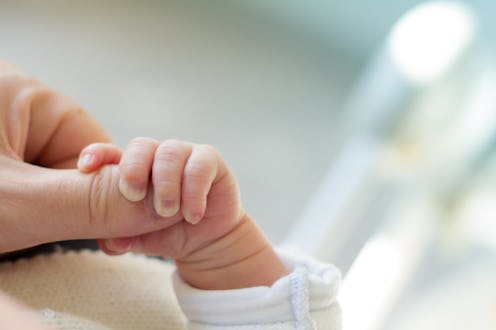Life
Babies Who Look Like Their Dads May Have A Health Advantage — But The Reason Is Problematic
As much as every parent might wish it so, there is no scientific formula for raising a perfectly healthy kid. However, new research suggests that certain factors like time spent together and paternal resemblance are linked to babies’ health. Specifically, this recent study found that kids who spent more time with their fathers were healthier at age one than those who spent less time with their dad. Additionally, researchers found that if a baby resembled their father, the two were more likely to spend time together.
It’s important to note that the study, published in the Journal of Health Economics, focused solely on families comprised of single mothers and fathers who did not live in the same home as the mother and child. Researchers looked at 715 families where the baby lived with their mother, measuring their health over the course of the baby’s first year.
They found that fathers who cited paternal resemblance spent 2.5 more days with their child than those who didn’t. Researchers also found that extra time spent with dad correlated with better health in the child, like fewer doctor visits for illness.
In turn, one interpretation of the study is that babies who look like their dads are healthier. However, that would be an oversimplification of the study, not to mention potentially have negative implications on families who, say, aren’t heteronormative or have children who are adopted.
Marlon R. Tracey, Southern Illinois University Edwardsville assistant professor and co-author of the study, told Bustle over email, “We interpret our results as evidence that father’s time matters to child health in low-income single-mother families. We are not suggesting that resemblance (or evidence of paternity) be used as a tool to secure better child outcomes.”
Bustle spoke with Dr. Fran Walfish — who is a Beverly Hills family and relationship psychotherapist, author of The Self-Aware Parent, regular expert child psychologist on The Doctors, CBS TV, and co-star on Sex Box, WE tv. — who shared her concerns about harmful interpretations of the study.
“Fathers (and mothers) can unintentionally favor a particular child because of not only physically looking alike but also a similar style personality or chemistry alignment,” Dr. Walfish said over email. “The parent may also share an affinity for sports, the arts, music, history, or anything in particular. Families and family systems are complicated. Children feel these 'certainties' or favoritisms.”
Tracey noted their study, titled “If looks could heal: Child health and paternal investment,” also indicates that fathers who spend less time with and do not live with their child were “more responsive to father–child resemblance.” Tracey continues, “So, we advocate for policies (e.g. parenting classes) targeted at fathers with low time-investment to improve the situations of at-risk families.”
“The main explanation is that frequent father visits allow for greater parental time for care-giving and supervision, and for information gathering about child health and economic needs,” study co-author and Binghamton University professor Solomon Polachek told Business Insider.
Dr. Walfish, like study co-author Tracey, also emphasized the importance of individualized time between parent and child or, as she calls it, “special time.” She says, “It has been found that children are happier and more secure when they have a short non-interrupted opportunity every day to connect with their parent(s) on a one-on-one level,” noting that this time can be as little 10 minutes at day.
Of course, there is no “right” way to be a parent, just as there is no “right” way to be a family. Parents, children, and people as a whole are not a monolith. But if there’s one thing we all have in common, it’s our ability to thrive when loved and cared about. If this study shows anything, it’s that time spent together, even a few minutes a day, can have a lasting impact.
